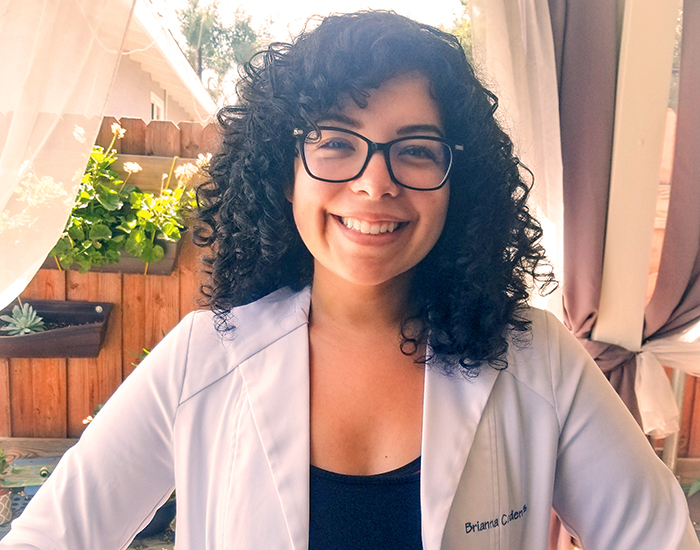Brianna Cardenas, Director of Clinical Education and Professor of Practice for Keck Graduate Institute (KGI)'s Master of Science in Physician Assistant Studies program, recently gave a presentation on Joint Hypermobility and Ehlers-Danlos Syndromes (EDS) at the American Academy of Physician Assistants (AAPA) 2021 Conference. Not only is this the first time this topic has been presented at AAPA or any other physician assistant (PA) conference, but the topic carries personal significance for Cardenas, who herself has EDS.
EDS is a group of hereditary disorders characterized by joint hypermobility (joints that move further than normal range), joint instability (partial separation of the articulating surfaces of a joint), and skin hyperextensibility (skin that can be stretched further than normal). Common symptoms include joint pain, fatigue, and fragile skin that tears or bruises easily.
EDS is frequently misdiagnosed and under-treated, and it takes an average of 14 years to diagnose. Thus, the goal of Cardenas's presentation, "Joint Hypermobility and the Ehlers-Danlos Syndromes", was to educate PAs on how to recognize and treat EDS.
Cardenas was diagnosed with EDS at 20 but struggled with years of severe back pain before her diagnosis. As a teen, her sacroiliac (SI) joint was dislocated after knee surgery—though she wasn't aware of the dislocation at the time. Doctors dismissed her concerns about the pain.
"They told me I was anxious because my knee wasn't healing as fast as I wanted it to, and the anxiety was causing the pain," Cardenas said.
Eventually, her surgeon referred her to a psychiatrist for anxiety and prescribed her pain medication for her first three years of college. At the University of La Verne, where she received her bachelor’s in Athletic Training, part of her curriculum involved rotations as an athletic training assistant in a physical therapy setting. There, a physical therapist noticed that she was in pain, concluded that her SI joint was dislocated, and quickly corrected it with a couple of exercises.
"He was the first person that actually examined my body and correctly determined why I was in pain," Cardenas said.
She was eventually diagnosed with EDS and told that she would need extensive physical therapy to correct her joint hypermobility and instability. At the time, Cardenas felt that her symptoms were manageable as her life was not severely limited.
However, in 2015 she began experiencing severe nausea, headaches, vision changes, and brain fog. Over the next couple of years, her symptoms intensified to the point where she found it hard to stand up, forgot basic information like her phone number, and experienced numbness in her left leg and arm.
Once again, doctors dismissed her symptoms and denied that they were related to EDS. Through her own research, she concluded that she had a spontaneous cerebrospinal fluid (CSF) leak, which sometimes occurs alongside EDS.
CSF surrounds the brain and spinal cord, cushioning them from injury and delivering nutrients to the brain while removing waste. When the CSF leaks through a tear in the connective tissue surrounding the brain and spinal cord, it can cause the symptoms Cardenas was experiencing. Eventually, she underwent back surgery, which corrected the CSF leak.
All of these experiences inspired Cardenas to become an advocate for those with EDS. After recovering from back surgery, she began doing podcasts and giving presentations to help raise awareness of the condition within the medical community and the general public.
Cardenas completed the Master of Science in Physician Assistant Studies program at Western University of Health Sciences in 2013. She is now a Physician Assistant, Certified Athletic Trainer, and Professor specializing in chronic pain management.
She is also the owner of Healed and Empowered LLC, a health education and consulting company for people with chronic pain and comorbid conditions. Her company takes a holistic approach to healing and pain management, offering nutrition, cannabis, movement, and mindset resources.
"I created these opportunities for patients to get educated because a lot of these conditions overlap, and people don't know where to turn."
"I don't want anybody else to feel like they have to do it on their own. And now it's a cool full-circle moment to be able to present at a forum that's not just about EDS or rare diseases but an actual national conference with colleagues that are going to see these patients," Cardenas said.
Part of Cardenas's work involves finding mental health support for patients, as the experience of living with chronic pain can be mentally and emotionally draining. At the same time, she also helps people to reach a state of acceptance.
"Not everybody recovers back to 100% of their pre-illness self, but that doesn't mean there's no hope," Cardenas said. "Life can look different, and you can have some limitations compared to your previous life, but personally, I've also been able to explore the depth and breadth of human emotions that I wouldn't have had the opportunity to reflect upon if my life hadn't been uprooted by illness."
Cardenas's mission as a PA educator has been to teach students about rare conditions such as EDS, as typically, PA and medical schools do not provide extensive education on these conditions, leading to misdiagnosis.
"You can't even begin to process and heal until you know what's happening in your body," Cardenas said. "I teach healthcare providers what to look for so patients aren't waiting 14 years for a diagnosis. I still get texts from former students describing how they could diagnose and treat a patient with EDS. There's no better feeling than that."
